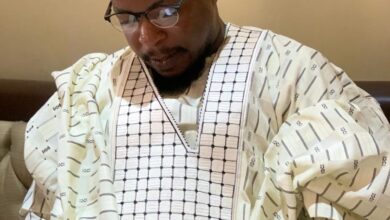
Reasons Why The Prophet Prayed Over The Corpse Of Negus In Absential: Setting The Record Straight
1. An-Najāshī was a Christian king and NOT a JEW. Apparently, he mixed things up, saying that the man was a Yahūdī (Jew) and Christian. Abyssinia at the time was a Christian province and not a Jewish province.
2. The Muslims went to Abyssinia to SEEK REFUGE under the just and accomodating ruler. Their mission was not to start doing waasi around the town as he claimed.
3. An-Najāshī accepted Islām and died a Muslim. This is the position held by Muslim scholars for centuries based on clear evidence.
يقول شيخ الإسلام ابن تيمية رحمه الله: من بلغته دعوة النبي صلى الله عليه وسلم في دار الكفر، وعلم أنه رسول الله، فآمن به، وآمن بما أنزل عليه، واتقى الله ما استطاع، كما فعل النجاشي وغيره…
Ibn Taimiyah rahimahuLlāh said: “Whoever receives the Da’wah of the Prophet (may the peace and blessings of Allāh be upon him) while being in an abode of disbelief, acknowledged him as an Apostle of Allāh, believed in him.andnin what was revealed to him and fear Allāh to the best of his ability as did An-Najāshī…”
4. An-Najāshī is regarded as a Companion of the Prophet by the scholars of Islām. Adh-Dhahabī mentioned this in his Siyar.
النجاشي
أخبار النجاشي واسمه اصحمة ملك الحبشة معدود في الصحابة رضي الله عنهم وكان ممن حسن إسلامه ولم يهاجر ولا له رؤية فهو تابعي من وجه صاحب من وجه وقد توفي في حياة النبي ﷺ فصلى عليه بالناس صلاة الغائب ولم يثبت أنه صلى صلى الله عليه وسلم على غائب سواه وسبب ذلك أنه مات بين قوم نصارى ولم يكن عنده من يصلي عليه لأن الصحابة الذين كانوا مهاجرين عنده خرجوا من عنده مهاجرين إلى المدينة عام خيبر
5. The news of An-Najāshī’s death in far away Ethiopia was broken by the Prophet (may the peace and blessings of Allāh be upon him) on the same day that it happened because it was REVEALED to him by Allāh and NOT because he possessed knowledge of the unseen.
Imām Muslim narrated that on the day that An-Najāshī died, the Prophet (may the peace and blessings of Allāh be upon him) said:
مات اليوم عبد لله صالح أصحمة
“Today, Asmaha, a righteous servant of Allāh has died.”
قال النووي رحمه الله في شرح حديث مسلم المذكور: وفيه معجزة ظاهرة لرسول الله صلى الله عليه وسلم لإعلامه بموت النجاشي وهو في الحبشة في اليوم الذي مات فيه… انتهى.
An-Nawawī rahimahuLlāh in his commentary on the above Hadīth wrote:
“In this is a clear miracle for the Messenger of Allāh (may the peace and blessings of Allah be upon him). His announcement of the death of An-Najāshī who is far away in Abyssinia on the day in which he died…”
The knowledge of the unseen is UNKNOWN to any creature in the heavens and on earth. Allāh says:
قُلْ لَا يَعْلَمُ مَنْ فِي السَّمَاوَاتِ وَالْأَرْضِ الْغَيْبَ إِلَّا اللَّهُ ۚ
“Say: No one in the heavens or in the earth has the knowledge of the unseen except Allah…” (27:65)
In fact, the Messenger of Allāh (may the peace and blessings of Allāh be upon him) said:
قُلْ لَا أَمْلِكُ لِنَفْسِي نَفْعًا وَلَا ضَرًّا إِلَّا مَا شَاءَ اللَّهُ ۚ وَلَوْ كُنْتُ أَعْلَمُ الْغَيْبَ لَاسْتَكْثَرْتُ مِنَ الْخَيْرِ وَمَا مَسَّنِيَ السُّوءُ ۚ
“Further tell them: “I have no power to acquire benefit or avert any harm from myself, only that happens which Allah wants. Had I possessed the knowledge of the unseen I would have acquired many benefits to myself; and no harm would have touched me…” (7:188)
He also said:
وَلَا أَقُولُ لَكُمْ عِنْدِي خَزَائِنُ اللَّهِ وَلَا أَعْلَمُ الْغَيْبَ
“I do not say that I possess the Treasures of Allah, nor do I say that I have knowledge of the unseen…” (11:31)
6. The prayer offered by the Prophet (may the peace and blessings of Allāh be upon him) is called صلاة الغائب and not صلاة الغيب. It was the first and last that the Prophet did for anyone.
7. The reason why the Prophet (may the peace and blessings of Allah be upon him) prayed on An-Najāshī was because of his Islam and not because of his kindness. A non-Muslim, no matter how kind he was to the Muslims, can never enjoy such benefits. The Prophet’s action is a further proof that An-Najāshī died a Muslim. Abū Tālib, the Prophet’s uncle was more kind to the Prophet, but he died a Mushrik, and the Prophet never made Du’ā for him, let alone pray over his corpse.
8. The poem:
وما نار بمورقة الجواد ولوكان الجواد من المجوس
Is rendered properly as:
وما نار بمورقة جوادا ولوكان الجواد من المجوس
Al-Ālūsī in his Tafsīr (Rūh al-Ma’ānī) of Q4:39 mentioned (the story is unfounded anyways) that once, a Magian gave a hundred Dīnār in charity and it was said to him, this will not benefit you in the hereafter. So the Magian became sad and looked up to the sky. Suddenly, a note fell from the sky with the following two lines of poem written in green ink:
مكافأة السماحة دار خلد وأمن من مخافة يوم بؤس
The reward for generosity is the eternal abode (Jannah) and protection from the awe of the day of calamity
وما نار بمورقة جوادا ولوكان الجواد من المجوس
Fire shall never burn the generous one even if he’s from among the Magians.
First, it’s important to note that this story is unfounded as that Tafsīr work is full of such cock and bull narrations.
Second, the Qur’ān is clear on the position of people on the Day of Judgement, and it’s BELIEF in ALLĀH first, before righteous deeds. Anyone with a mountain of righteous deeds but ZERO BELIEF is an automatical candidate for Hellfire. Hātim At-Tā’ī, with his generosity never believed in Allāh for a minute and his generosity will not benefit him.
Third, after narrating the poem, Al-Ālūsī added:
يعني أن الله تعالى يوفّق السخيّ للإيمان إن كان كافرا ولزيادة الطاعة والإخلاص إن كان مؤمنا
“It means that Allāh will (or MAY) guide the generous person to Islām if he were a disbeliever and will increase him in obedience and sincerity if he were a believer.”
By Sanusi Lafiagi Phd
Discover more from Labaran Yau
Subscribe to get the latest posts sent to your email.



















